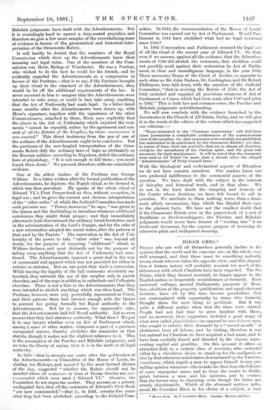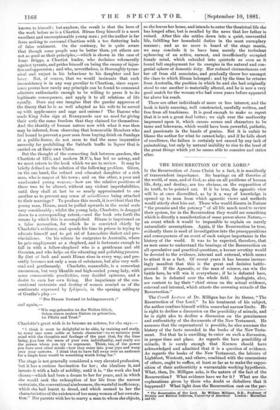HIRAM GREG.*
PEOPLE who are well off themselves generally incline to the opinion that the world and its concerns are, on the whole, very well arranged, and that there must be something radically wrong about whoever takes the opposite view ; and this disposi- tion of human nature will probably account for much of tho abhorrence with which Chartists have been regarded. The Six Points, which they deemed essential, no longer appear to the English nation so desperately revolutionary as formerly. Even universal suffrage, annual Parliaments, payment of Mem- bers, abolition of the property qualification, and equal electoral districts, have all by this time become possibilities that are contemplated with equanimity by many who formerly thought them the next thing to perdition. But it was quite a different matter when first the ideas were started. People had not had time to grow familiar with them ; and as, moreover, their supporters included a good many of what were called physical-force (as opposed to moral-force) men, who sought to enforce their demands by a " sacred month " of abstinence from all labour, and by rioting, therefore it was but natural for Chartism to have acquired a bad name, and to have been cordially feared and detested by the classes repre- senting capital and gentility. On this account it offers an attractive field to a certain class of novelists, who—actuated either by a chivalrous desire to stand up for the maligned, or else by that otherwise-mindedness (denominated by the Yankees, cussedness), which impels a man to oppose himself to any pre- vailing opinion whatever—like to take for their hero the follower of some unpopular cause, and to force the reader to distin- guish between a man and his opinions, and to confess that the former may be charming, even though the latter are utterly objectionable. Which of the aforesaid motives influ- enced Mr. Crowther Hirst in his choice of a subject, is best • Hiram Greg. By T. Crowther Hirst. London Bentley and Bon.
known to himself ; but anyhow, the result is that the hero of the work before us is a Chartist. Hiram Greg himself is a most excellent and unexceptionable young man ; yet the author is far from seeking to surround Chartism with a too flattering halo of false sentiment. On the contrary, he is quite aware that though some people may be better than, yet others are not as good as their principles,—which is shown in the case of Isaac Briggs, a Chartist leader, who declaims vehemently -against tyrants, and prides himself on being the enemy of injus- tice and oppression ; and who, nevertheless, is thoroughly tyran- nical and unjust in his behaviour to his daughter and her lover. Not, of course, that we would insinuate that such inconsistency is in any way peculiar to Chartism, since exper- ience proves how rarely any principle can be found to command admirers enthusiastic enough to be willing to press it to its legitimate consequence, and apply it to all relations of life equally. Does any one imagine that the gander approves of the theory that he is as well adapted as his wife to be served up with apple-sauce and sage and onions P The Barons who made King John sign at Runnymede saw no need for giving their serfs the same freedom that they claimed for themselves- And the identity of human nature now with what it was then may be inferred, from observing that honourable Members who feel bound to prevent a poor man from buying drink on Sundays at a public-house; do. not seem to find the same imperative necessity for prohibiting the Sabbath traffic in liquor that is carried on at their own Clubs.
But the thought of the connecting link between ganders, the Chartists of 1215, and modern M.P.'s, has led us astray, and we must return to the book which we are to review. It may be briefly defined as the solution of the following problem. Given, on the one hand, the refined and educated daughter of a rich man, who is mayor of his town ; and on the other, a poor and uneducated young weaver,—how are the relative positions of these two to be altered, without any violent improbabilities, until they shall at last be so nearly approximated to one another as to prevent any sense of ,misalliance being attached to their marriage ? To produce this result, it is evident that the young man, Hiram, must be pulled upwards in the social scale very considerably ; whilst the young lady, Charlotte, is dragged down to a corresponding extent,—and the book sets forth the means by which this is accomplished. Hiram is imprisoned on a false accusation, for which he is convicted chiefly by 'Charlotte's evidence, and spends his time in prison in trying to educate himself and to get rid of Lancashire dialect and pro- vincialisms. On his release he emigrates to Australia, where he gets employment as a shepherd, and is fortunate enough to fall in with a fellow-shepherd who is a gentleman and old Oxonian, and who helps on the educating and polishing process. By dint of luck and merit Hiram rises in every way, and pre- sently becomes not only a man of substance, but also very well- read and gentlemanly. Charlotte, meanwhile, is a somewhat uncommon, but very likeable and high-souled young lady, with some communistic proclivities, very decided opinions, and a -desire to earn her own living. Her impatience of the con- ventional restraints and destiny of women remind us of the sentiments expressed by Iphigenie, in the opening soliloquy of Goethe's play :-
" Der Frauen Zastand ist beklagenswerth ;" and again,— " Wie eng-gebunden ist des Weibes Gluck, Schon einem rauhen Gatten zn gehorchen, 1st Pflicht and Trost."
-Charlotte's great wish is to become an actress, for she says :— " I think it must be delightful to be able, by training and study, to enter into some noble or heroic character—to so saturate your mind with the thoughts and feelings of the part that, for the time being, you lose the sense of your own individuality, and really are the person whom you try to represent. Think, too, of the power you have over other minds—how they enter into your joys and weep over your sorrows. I think that to have fall sway over an audience for a single hour would be something worth living for."
The stage is not generally considered a very elevated profession, but it has a curious fascination for her ; she idealises it, and invests it with a halo of nobility, until it is, " the work she had chosen—which had been a dream to her for years, and in which she would seek the redemption of her life from the narrow restraints, the conventional aimlessness, the wasteful inefficiency, which she had learnt to dread, and which seemed to her the characteristics of the existence of too many women of her own sta- tion." Her parents wish her to marry a man to whom she objects, so she leaves her home, and intends to enter the theatrical life she has longed after, but is recalled by the news that her father is ruined. After this she settles down into a quiet, uneventful life, fulfilling her household duties in the most exemplary manner ; and as no more is heard of the stage mania, we may conclude it to have been merely the turbulent upheaving of an active, earnest, and insufficiently occupied female mind, which subsided into quietude as soon as it found full employment for its energies in the natural and con- genial sphere of domestic duty. Her reduced circumstances cut her off from old associates, and gradually throw her amongst the class to which Hiram belonged ; and by the time he returns from Australia, the position in which he and she had originally stood to one another is materially altered, and he is now a very good match for the woman who had some years before appeared far above his reach.
There are other individuals of more or less interest, and the book is fairly amusing, well constructed, carefully written, and free from all trashiness. It is good enough to make us regret that it is not a great deal better; we sigh over the mediocrity impressed upon it, which causes scenes and characters to be tame and lukewarm, which would have been powerful, pathetic, and passionate in the hands of genius. But it is unfair to blame the author for what he cannot help; and if he falls short of excellence, the failure is certainly not caused by any lack of painstaking, but only by natural inability to rise to the level of the great things which yet he seems able to conceive and strive after.































 Previous page
Previous page